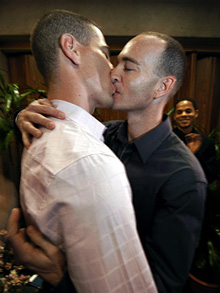 |
 |
 |
 Editorials | Issues | December 2006 Editorials | Issues | December 2006  
Wins for 3 Countries in Gay Marriage Fight
 Elizabeth A. Perry - nyblade.com Elizabeth A. Perry - nyblade.com


| | The marriage of Tel Aviv residents Etai Pinka, (left), and Yoav Arad, shown here after their 2005 wedding in Canada, may now be recognized in their home county of Israel following a recent court ruling there. (Derek Oliver/AP) |
While voters in seven U.S. states approved constitutional bans on same-sex marriage last month, courts and lawmakers in three other countries made headline-grabbing progress on the issue of gay unions, providing some encouragement to activists here.

Mexico City now allows civil unions, Israel officially recognizes the status of gay couples married in other countries. And South Africa has legalized same-sex marriage. U.S. gay activists viewed those developments as steps in the right direction for marriage equality in the U.S. and abroad.

“The United States is lagging far behind many of our key allies and trading partners, when it comes to protections and respect for same-sex couples and families,” said Evan Wolfson, director of Freedom to Marry. “The nations whose basic values and commitment to pluralism the United States has historically shared, continue to move in the direction of inclusion and equality while the United States falls further behind.”

The Israeli Supreme Court ruled 6-1 on Nov. 21 that the country must recognize the status of same-sex married couples wed in other countries.

Gay marriage is not legal in Israel, but gay couples there already have many of the rights of heterosexual partnerships. Under this new court decision, Israeli gay couples will be entitled to the same tax breaks that married couples receive and be able to adopt children.

The ruling came about as the result of a case involving five gay couples. One of the lead plaintiff couples, Yosi Ben-Ari and Laurent Schumann, were married in Canada and moved to Israel three years later. The couple, together for 21 years, sought the same legal rights as married heterosexual couples.

Paula Ettelbrick, executive director of the International Gay & Lesbian Human Rights Commission, calls the Israeli decision a profound development in the fight for global marriage equality. She said the decision could help open the door for greater recognition of same-sex relationships down the road worldwide.

“It is important to understand that an enormous question has been answered positively by the Israeli [courts],” she said.


S. Africa, Mexico City make pro-gay strides

After decades of struggle under Apartheid, the relatively new South African Constitution prohibited discrimination based on sexual orientation when it went into effect in 1994. The Supreme Constitutional Court ruled that same-sex relationships be recognized in 2005. Last week, the South African parliament passed a law legalizing gay marriage.

In contrast, Ettelbrick said in countries farther north, where tribal and traditional religious beliefs hold sway, homosexuality can be punishable by death. Some 12 Shari’a, or Islamic African states, still impose the death penalty for sexually active gays and lesbians.

And in another related development, the Mexico City legislative assembly voted to recognize gay civil unions, making it the largest city in the country to offer unmarried couples the same benefits as heterosexual married couples.

The vote was 43 in favor of civil unions and 17 against. The dissenting votes were all from the conservative National Action Party, which supports “traditional” families. The law does not approve gay marriage, but it does include inheritance and property rights, health insurance and medical decisions for gay couples. Ettelbrick said that because the law is so new it is hard to know if civil unions recognized in Mexico City will be recognized elsewhere in Mexico.

Massachusetts is the only U.S. state that allows same-sex marriage, though Vermont and Connecticut recognize civil unions.

Constitutional amendments banning gay marriage have been passed in 26 states while 19 have state laws restricting marriage to one man and one woman.

Wolfson said marriage developments in other parts of the world can help advance the case for gay marriage in the United States, especially as it moves from a concept to reality. Given enough time, he said, legal precedents and reasoned domestic and international court decisions may guide U.S. courts toward adopting a more progressive stance. | 
 | |
 |



